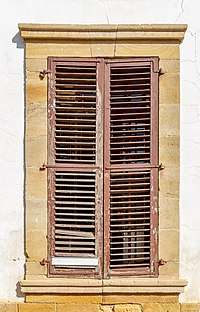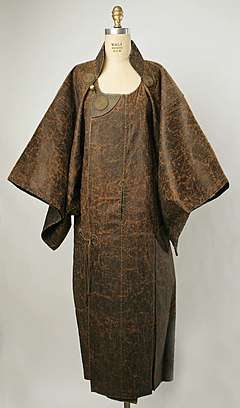كپنك
Ottoman Turkish
Etymology 1

.jpg)
The origin is uncertain. Usually considered an Armenian borrowing and compared to Armenian կղպանք (kłpankʿ), փականք (pʿakankʿ, “lock”), կապանք (kapankʿ, “fetter”), խեփեկ (xepʿek, “skylight”), with a possible influence of قاپاق (kapak, “cover, lid, shutter”). The closest connection is with dialectal Armenian գաբանք (gabankʿ, “skylight; shutter; entrance”), also spelled գաբանկ (gabank), գաբոնք (gabonkʿ), գափունք (gapʿunkʿ), Moks dialect կյա̈փա̊նքյ (kyäpʿånkʿy, “trapdoor in the floor”). However, Ačaṙean considers these Turkish reborrowings and derives the Turkish from assumed Armenian *կափանք (*kapʿankʿ, “snare; lid”), from կափ- (kapʿ-).
Alternative forms
- خپنك (hepenk)
Pronunciation
- IPA(key): [cɛˈpɛɳc]
Noun
كپنك • (kepenk)
Descendants
- Turkish: kepenk
- → Albanian: qepéng
- → Armenian: քեփենկ (kʿepʿenk)
- → Bulgarian: кепѐнк (kepѐnk), кепѐнец (kepènec), капѐнец (kapènec), капѐнек (kapènek)
- → Greek: κεπέγκι (kepégki)
- → Macedonian: ќепенец (ḱepenec), ќепенек (ḱepenek), ќепенок (ḱepenok), ќепеник (ḱepenik)
- → Serbo-Croatian:
References
- “кепѐнк”, in Български етимологичен речник [Bulgarian Etymological Dictionary] (in Bulgarian), volume 2, Sofia: Bulgarian Academy of Sciences, 1979, page 331
- Ačaṙean, Hračʿeay (1973), “գաբանք”, in Hayerēn armatakan baṙaran [Dictionary of Armenian Root Words] (in Armenian), volume II, 2nd edition, reprint of the original 1926–1935 seven-volume edition, Yerevan: University Press, pages 495–496
- Dankoff, Robert (1995) Armenian Loanwords in Turkish (Turcologica; 21), Wiesbaden: Harrassowitz Verlag, pages 165–166
- Eren, Hasan (1999), “كپنك”, in Türk Dilinin Etimolojik Sözlüğü [Etymological Dictionary of the Turkish Language] (in Turkish), 2nd edition, Ankara: Bizim Büro Basım Evi, pages 231–232
- Meninski, Franciszek à Mesgnien (1680), “كپنك”, in Thesaurus linguarum orientalium, Turcicae, Arabicae, Persicae, praecipuas earum opes à Turcis peculiariter usurpatas continens, nimirum Lexicon Turkico-Arabico-Persicum, Vienna, column 3865
- Nişanyan, Sevan (2002–), “kepenk”, in Nişanyan Sözlük
- Orbeli, I. A. (2002) Izbrannyje trudy v dvux tomax. Tom II. Materialy ekspedicii 1911—1912 gg. po etnografii i folʹkloru Moksa. Slovarʹ narečija Moksa. Problemy gradostroitelʹstva i arxitektury Srednevekovoj Armenii [Selected Works in Two Volumes. Volume II. The 1911–1912 Expedition Materials on the Ethnography and Folklore of Moks. A Dictionary of Moks Dialect. The Problems of Urban Planning and Architecture of Medieval Armenia], Yerevan: Academy Press “Gitutjun”, →ISBN, page 262
- Sargsyan, Artem et al., editors (2001), “գաբանք”, in Hayocʿ lezvi barbaṙayin baṙaran [Dialectal Dictionary of the Armenian Language] (in Armenian), volume I, Yerevan: Hayastan, page 226b
- Zenker, Julius Theodor (1876), “كپنك”, in Türkisch-arabisch-persisches Handwörterbuch, volume 2, Leipzig: Wilhelm Engelmann, page 736a
Etymology 2

Unknown, also Chagatai كیپنك (kepänäk), Turkmen кебенек, Karachay-Balkar гебенек, Kazakh кебенек (kebenek), Kyrgyz кебанак (kebanak), кебенек (kebenek), кибенек (kibenek), Uzbek кебәнәк, кәбәнәк, кәпәнәк, Tatar кәбәнәк (qäbänäq), Tuvan хевенек (hävänäk), dialectal Bashkir кәбәнәк (käbänäk), ҡәбәнәҡ (qäbänäq), Mongolian хэвнэг (hevneg), Kalmyk кевнг (kevng), Armenian գաբանակ (gabanak), Georgian გვაბანაკი (gvabanaḳi). Possibly from an extinct Central Asiatic substrate; unlikely distorted from Arabic كَفَن (kafan) since this distinctly means the shroud of a dead and the /f/ is missed. Possibly related to Chuvash чикмэн (čikmen), Bashkir сикмән (sikmän), сәкмән (säkmän), Tatar чикмэн (çikmen), etc., Russian чекме́нь (čekménʹ), denoting a kind of kaftan or rough cloth, also in Tatar чебкән (çebkän), чипкән (çipkän), цикмән (tsikmän), цәкмән (tsäqmän), and Southern Altai чӓпкӓн (čӓpkӓn), чепкен (čepken), Kyrgyz чепкен (çepken), Karachay-Balkar чепкен, Komi-Zyrian чепкен (čepken), Azerbaijani çəpkən.
Alternative forms
- كوپنك (köpenek, küpenek)
Pronunciation
- IPA(key): [cɛ.pɛ.ˈnɛk], [cɛ.pɛ.ˈnɛɡ]
Descendants
- Turkish: kepenek
- → Bulgarian: кепѐнек (kepѐnek)
- → Hungarian: köpenyeg, köpönyeg
- → Serbo-Croatian: kepenjek (Kajkavian)
- → Slovene: kepenjek
- → Ukrainian: кебеня́к (kebenják), кобеня́к (kobenják), кепеня́к (kepenják), копеня́к (kopenják), ке́пень (képenʹ), ки́пень (kýpenʹ)
- → Czech-Slovak:
- Czech: kepeň (archaic)
- Slovak: kepeň, kepeňak (archaic)
- → Belarusian: кабеня́к (kabjenják), капеня́к (kapenják) (16th–17th century, spelling according to modern rules)
- → Russian: кобеня́к (kobenják), копеня́к (kopenják) (normally in reference to Ukraine, Belarus, Tatars, Cossacks etc.)
- → Polish: kopieniak, kiepieniak (16th–19th century)
- → German: Keperneck, Köperneck (Silesia, Wallachia), Geberneck, Gebenek, Gewenek (Bavarian)
- → Czech-Slovak:
- → Romanian: chepeneág, căpeneág
- → Persian: کپنک (kapanak)
- → Serbo-Croatian: (obsolete, Serbia regional)
- Cyrillic: кѐпенак, ка̀пенак, кѐпењак
- Latin: kèpenak, kàpenak, kèpenjak
References
- “кепѐнек”, in Български етимологичен речник [Bulgarian Etymological Dictionary] (in Bulgarian), volume 2, Sofia: Bulgarian Academy of Sciences, 1979, page 331
- Doerfer, Gerhard (1967) Türkische und mongolische Elemente im Neupersischen [Turkic and Mongolian Elements in New Persian] (Akademie der Wissenschaften und der Literatur: Veröffentlichungen der Orientalischen Kommission) (in German), volume 3, Wiesbaden: Franz Steiner Verlag, page 581–583
- Meninski, Franciszek à Mesgnien (1680), “كپنك”, in Thesaurus linguarum orientalium, Turcicae, Arabicae, Persicae, praecipuas earum opes à Turcis peculiariter usurpatas continens, nimirum Lexicon Turkico-Arabico-Persicum, Vienna, column 3865
- Zenker, Julius Theodor (1876), “كپنك”, in Türkisch-arabisch-persisches Handwörterbuch, volume 2, Leipzig: Wilhelm Engelmann, page 736a
- Аранђеловић-Лазић, Јелена (1978), “Народна ношња у околини Зајечара”, in Гласник Етнографског музеја у Београду (in Serbo-Croatian), volume 42, page 258 of 237–260
Pronunciation
- IPA(key): [cɛpɛˈnɛc]
